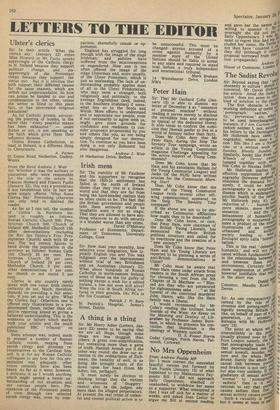Ulster's clerics
Sir: In their article What the clerics say ' (January 22) either Miss Howard or Mr Fuchs speaks approvingly of the Catholic clergy in N. Ireland because they support
political change, and disapprovingly of the Protestant clergy because they support the status quo. But it is obvious that both support their different causes for the same reasons, which are selfish but understandable. So how can praise be handed to one and condemnation to the other, unless the writer is blind to this plain fact, or has unrevealed religious
prejudices? As for Catholic priests, advocating the planting of bombs, in the belief that "every peaceful means has been exhausted " — under duress or not, is not speaking as the faith which gives them their influence dictates.
Unless Roman Catholicism, at least in Ireland, is a different thing to Christianity.
A. Parkes
61 Copse Road, Netherton, Dudley, Worcs
From the Revd Andrew J. Weir Sir: Whether it was the authors or
yourselves who were responsible for the title to the article by Frances Howard and Francis Fuchs (January 22), this was a pretentious if not tendentious title. In fact we were simply offered 'What Some Clerics Say.' Pretending otherwise can only tend to mislead the reader.
As far as I can tell, the number
of ' clerics ' in Northern Ireland is roughly as follows: Roman Catholic Church 800, Presbyterian Church 500, Church of Ireland 400, Methodist Church 150, other denominations (including the Rev Ian Paisley's Free Pressbyterian Church) each with 50 or less. The last census figures to hand divide the population in the province as follows: Roman Catholic Church 35 per cent, Prebyterian Church 29 per cent, Church of Ireland 24 per cent, Methodist Church 5 per cent, other denominations 5 per cent. no church or not stated 2 per
cent.
Clerics in any country rarely speak with one voice: Irish clerics certainly do not. Much, therefore, depends on providing a fair selection, if you set out to give What the Clerics Say.' Otherwise one is offered only illustrations to a predetermined thesis, rather than objective reporting aimed at giving a balanced understanding. This is the weakness or failure which marks both your article and the much publicised BBC ' tribunal ' on Ulster.
Some attempt was, indeed, made to present a number of Roman Catholic voices, ranging from parish clergy and diocesan representatives to the Cardinal himself. It is for my Roman Catholic colleagues to say how far this pre sentation was adequate: other voices certainly have also been heard. As far as it went, however, I welcome it as I would anything which might spread a better understanding of our situation and our various people here. Pre sentation of the Protestant points of view through two selected parish clergy was, even by corn parison, shamefully casual or opportunist.
England has struggled for long enough with the image of the stage Irishman; and policies have suffered from the misconceptions so engendered. Now one is too often offered the image of the stage Ulsterman and, more usually. of the Ulster Protestant, which is just as misleading. The lack of understanding probably applies most of all to the Ulster Presbyterian. who may seem a stranger, both religiously and politically, to the average Englishman (and, indeed, to the Southern Irishman) if somewhat less so to the Scots and Welsh. More efforts to understand and to appreciate our people, even if not necessarily to agree with us, might give more grounds for confidence and readiness to consider proposals propounded by you and others like you, as not being simply designed for our destruction. To continue as you have been doing is not only dishonest but also dangerous.
Andrew J. Weir 16 Harberton Drive. Belfast










































 Previous page
Previous page